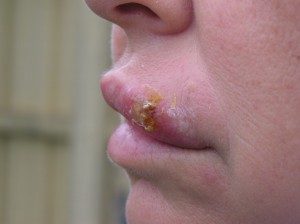(and you probably do, too)

Anne sneezed. She began to be afraid she was taking a cold in the head. How ghastly it would be to sniffle all through dinner under the eyes of Mrs. Andrew Dawson, nee Christine Stuart! A spot on her lip stung . . . probably a horrible cold-sore was coming on it. Did Juliet ever sneeze? Fancy Portia with chilblains! Or Argive Helen hiccoughing! Or Cleopatra with corns!Yes, Anne of Green Gables, by the time she reached middle-age, had apparently joined the majority of adults who test positive for the virus herpes simplex type 1 — the cause of the painful, little mouth blisters known colloquially as "cold sores". Estimates vary when it comes to how many of us are HSV-1 carriers. A 2006 study found evidence of HSV-1 infection in 57.7 percent of American adults, ages 14 to 49.* Bryan Cullen, a virologist at Duke University, told me he's seen studies showing that closer to 70 percent of adults are infected — although only something like 1/3rd of those will ever get cold sores.
Don't judge Anne of Green Gables. Chances are good that you're in the same boat.
But why is this virus so common?
Unlike herpes simplex type 2 — the virus you probably think of when you think "herpes" — HSV-1 isn't necessarily a sexually transmitted disease. Most people are infected when they're still little kids. And they're infected by really common behaviors that nobody wants to stop anytime soon — namely, the practice of adults kissing little kids because they're just so darn kissable. (There are several scenes in Anne of Ingleside where Anne probably passes HSV-1 on to her own offspring.)
Lots of people get it as kids. Lots more get it as teenagers when they start kissing the people who caught it in childhood. There's not an easy way to stop that spread. At least, not any way that doesn't make you look sort of stern, unaffectionate, and anti-social. With HSV-2, there are increasingly social influences in place that discourage the spread of the disease. For HSV-1, it's exactly the opposite. Our societal norms make the spread of the virus almost inevitable.
Worse, the virus has some quirks that allow it to really take advantage of those social norms. Young Anne might not have been willing to kiss Marilla right on a gross, weeping blister. But Marilla didn't need a blister to spread the virus.
In fact, the symptoms described in Anne of Ingleside — feeling a tingling pain in the lip where the sore would eventually appear — are a hallmark of herpes blisters. That's because, when it's not hard at work making obvious blisters, the herpes virus can live, silently, in your nerve cells. The virus bunkers down and releases a type of RNA that prevents the host cell from dying. Nobody is entirely sure what causes relapses to happen, but the appearance of new blisters has been associated with any number of things — from other illnesses to stress. (It's worth noting that, in this passage, Anne is on the way to have dinner with her husband's old girlfriend and has, in general, been feeling pretty emotionally distraught about the state of her and Gilbert's relationship.)
Whatever the cause, when a new outbreak happens, the virus begins replicating itself and travels along nerve fibers called axons to reach the epithelial cells — the cells that make up your skin. This is where the showdown happens between the herpes and your immune system, and it's kind of a messy battle. The pain Anne is experiencing is a byproduct of the inflammatory immune response, Cullen told me.
Anne would be most contagious when she has a cold sore on her lip. But that doesn't mean she wouldn't be contagious the rest of the time. The virus is always there. Even if you can't tell a person has HSV-1, they could still be shedding viruses and infecting you.
Which brings me to one final point. I don't want to speculate on Anne and Gilbert's sex life, or yours. But everybody should be aware that "oral herpes" isn't confined to the mouth. Truth is, HSV-1 can pass from one host to another via any mucus membrane, and that includes the ones on your genitals. If somebody with oral herpes goes down on you, there's a possibility that they could give you oral herpes in a place that is most definitely not your mouth. And cases of this happening are one the rise. The virus is common, but the social side-effects can be pretty awkward. So this is a reason to at least consider condoms and dental dams for oral sex.
There is one bit of silver lining to the bummer that is orally transmitted herpes on your genitals. It's possible that someone infected this way wouldn't have recurrent outbreaks on their junk. "Some studies have reported that genital HSV1, and oral HSV2, cause fewer lesions in the non-traditional location," Cullen told me. "But again," he added, "fewer is not always none."
*And, yes, I know Anne of Green Gables was Canadian. The rates seem to be similar up there.

No comments:
Post a Comment